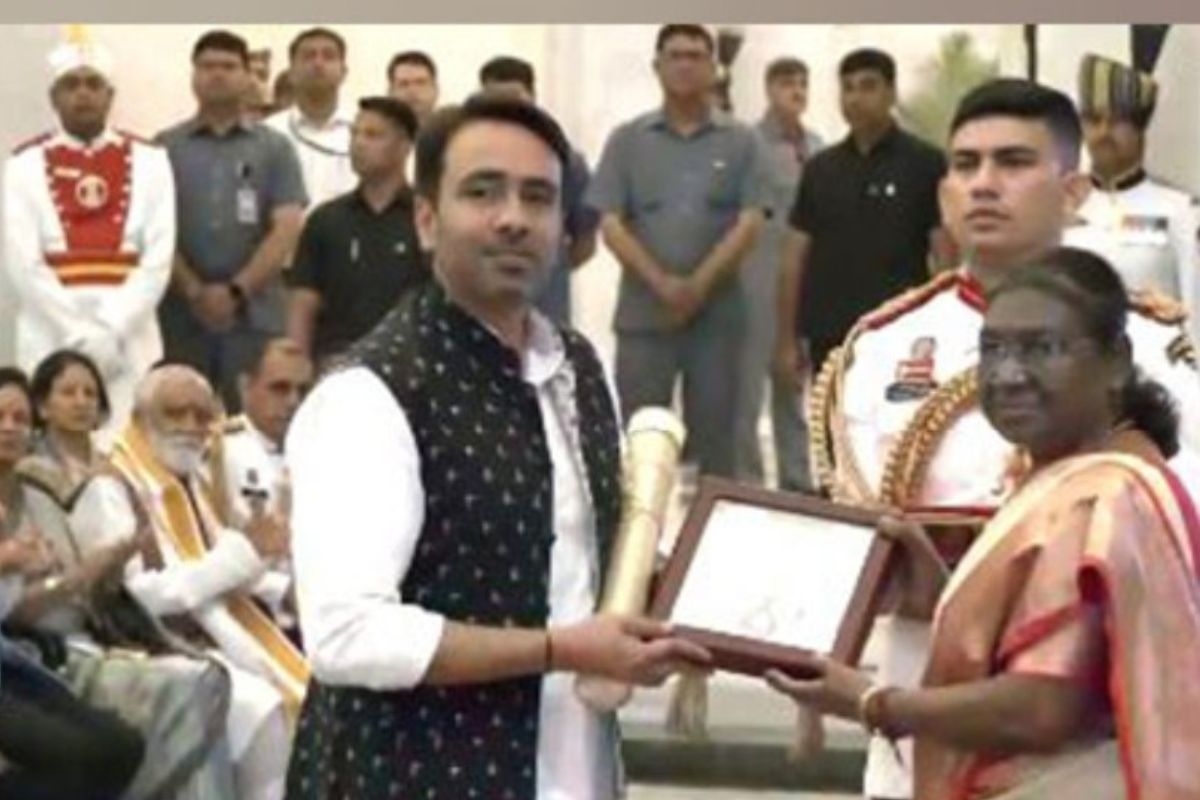President visits Advani to confer Bharat Ratna; Modi hails his contribution in shaping modern India
President Droupadi Murmu on Sunday conferred Bharat Ratna on BJP stalwart and former Deputy Prime Minister L K Advani.
President Murmu is likely to travel to BJP leader LK Advani’ residence to confer the prestigious award.

President Droupadi Murmu on Saturday presented four Bharat Ratna awards posthumously to former Prime Ministers Chaudhary Charan Singh and P V Narasimha Rao, at a solemn ceremony at Rashtrapati Bhavan.
Vice-President Jagdeep Dhankar, Prime Minister Narendra Modi, Home Minister Amit Shah, BJP president J P Nadda and Congress Party president and Leader of the Opposition in the Rajya Sabha Mallikarjun Kharge were present.
The four awardees were conferred the national honour posthumously. On behalf of late former Prime Minister P V Narasimha Rao, the Bharat Ratna was received by his son Mr P V Prabhakar Rao.
Advertisement
On behalf of late former Prime Minister Chaudhary Charan Singh, the Bharat Ratna was received by his grandson, Rajya Sabha member Jayant Chaudhary.
Agricultural scientist Dr M S Swaminathan was also awarded Bharat Ratna posthumously. On his behalf, the award was received by his daughter, Dr Nitya Rao.
On behalf of former Bihar Chief Minister and backward classes leader Karpoori Thakur, the award was received by his son, Rajya Sabha member Ramnath Thakur.
The government had announced five names for the Bharat Ratna awards this year, which included BJP leader L K Advani.
Sources said that President Murmu will pay a visit to senior BJP leader L K Advani’s residence and confer him with the prestigious award. This was decided in view of the ailing health of the veteran BJP leader.
Born on June 28, 1921, in Karimnagar, Telangana, being an agriculturist and an advocate, Mr P V Narasimha Rao joined politics and held some important portfolios. He was the Minister of Law and Information, 1962-64; Law and Endowments, 1964-67; Health and Medicine, 1967 and Education, 1968-71, in the Government of Andhra Pradesh.
He was the Chief Minister of Andhra Pradesh during 1971-73 and General Secretary of the All India Congress Committee during 1975-76.
Plant geneticist M S Swaminathan’s significant contributions to India’s agricultural sector earned him a reputation as the scientific leader of India’s green revolution movement. His work was instrumental in the agricultural renaissance of India.
Mr Advani was born in Karachi, in present-day Pakistan, on 8 November, 1927 and served as the President of the Bharatiya Janata Party for the longest period since its inception in 1980.
Capping a parliamentary career of nearly three decades, he was, first, the Home Minister and, later, the Deputy Prime Minister in the cabinet of Mr Atal Bihari Vajpayee (1999-2004).
Karpoori Thakur was born in 1924 in one of the most backward sections of society, the Nai Samaj. He was a remarkable leader whose political journey was marked by his unwavering commitment to the marginalised sections of society. He served as the Chief Minister of Bihar and was a key figure in the struggle against social discrimination and inequality.
Chaudhary Charan Singh was born in 1902 at Noorpur in Meerut district of Uttar Pradesh, in a middle class peasant family. He shifted to Meerut in 1929 and later joined the Congress. He was first elected to the UP Legislative Assembly in 1937 from Chhaprauli and represented the constituency in 1946, 1952, 1962 and 1967.
Mr Charan Singh was sworn in as Prime Minister on 28 July 1979, with outside support from Indira Gandhi’s Congress (I) party. He advised the President to dissolve the Lok Sabha after withdrawal of support by the Congress (I) party and then continued as caretaker Prime Minister until January 1980.
Earlier, Mr Charan Singh was Parliamentary Secretary in Pandit Govind Ballabh Pant’s Government in 1946 and worked in various departments such as Revenue, Medical and Public Health, Justice, Information etc.
In June 1951, he was appointed Cabinet Minister in the State and given charge of the Departments of Justice and Information. His career included holding charge as Minister for Revenue and Agriculture in the Cabinet of Sampurnanand in 1952. When he resigned in April 1959, he was holding charge of the Department of Revenue and Transport.
Advertisement